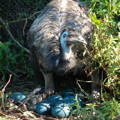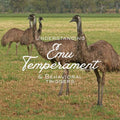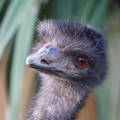
Recognizing Signs of Illness in Emus
Learn to identify signs of illness in emus, from changes in appetite and droppings to breathing and feather condition, ensuring early detection and effective treatment.
Pudding poop is normal in emus but diarrhea can be a sign of a medical issue that requires human intervention.
Subscribe
To join our mailing list and never miss an update!
Emus are relatively hardy creatures once they have reached maturity. However, as with all livestock, issues arise from time to time that require medical intervention. This article is designed to help the emu owner assess internal injuries and illnesses that may require veterinary treatment. Being able to notice warning signs early, provides the opportunity for faster intervention and successful treatment.
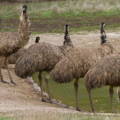
LOSS OF APPETITE
A noticeable decrease in appetite will often be the first sign an emu owner notices that something is wrong with their long-legged friend. Socially, the emu may still hang out with the mob while they are eating, but not show any interest in food. Weight loss and a dull body condition will result from whatever illness is affecting your bird but are also compounded by the lack of proper nutritional intake.
While a loss of appetite can be a symptom of many possible medical conditions, it is worth noting that male emus will significantly decrease and even stop eating while they are incubating a clutch of emu eggs. This is perfectly normal behavior and their bodies are designed to tolerate this long time period with very little food and water.
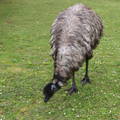
CHANGE IN DROPPINGS
While emu droppings are normally a pudding consistency, changes in droppings can be an important indicator of various health issues in emus. Some potential signs include:
1. Digestive Problems: Unusual consistency, such as diarrhea or overly dry droppings, can suggest digestive disturbances, including infections, poor diet, or ingestion of inappropriate materials.
2. Infections: Bacterial, viral, or parasitic infections can cause changes in the color, texture, and odor of droppings. For example, droppings may become watery, foul-smelling, or discolored.
3. Parasites: Internal parasites like worms or protozoa can lead to visible changes in droppings, such as the presence of blood, mucus, or eggs.
4. Dietary Issues: A sudden change in diet or ingestion of spoiled or toxic food can cause droppings to change in color, consistency, or frequency.
5. Dehydration: Dehydration can lead to small, hard, or dry droppings, indicating that the emu is not drinking enough water or is losing fluids due to illness.
6. Stress: Stress from environmental changes, handling, or social interactions can sometimes cause temporary changes in droppings, such as loose or inconsistent stools.
7. Liver or Kidney Issues: Changes in the color of droppings, particularly if they become pale, greenish, or contain undigested food, might indicate liver or kidney dysfunction.
8. Toxins: Ingestion of toxic substances or plants can result in abnormal droppings, which may be accompanied by other signs of poisoning, such as lethargy or labored breathing.
9. Blockage or Obstruction: If an emu's droppings become less frequent or cease altogether, it could indicate a blockage or impaction in the digestive tract, which requires immediate veterinary attention.
Monitoring an emu's droppings for any unusual changes can provide early clues to potential health problems, making it easier to address them before they become serious.
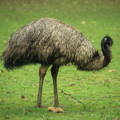
Lethargy or Change in energy Level
Emus are typically active and curious. A noticeable reduction in their activity level or reluctance to move can signal illness. Emus are naturally social animals, often forming bonds with at least one other emu. These pairs are frequently seen together, and a larger group of emus is known as a mob. A noticeable decrease in physical activity or social interaction can be an early indicator of illness or injury in an emu. If your emu becomes isolated or shows a lack of interest in foraging, it may be unwell.
To assess the emu's condition, you can try gently "goosing" it by placing your hands where the legs meet the underbelly and moving your fingers while raising your arms to encourage the bird to stand and walk. If the emu struggles to stay upright or quickly sits back down, it's important to conduct a manual examination, feeling the bird's body for any obvious signs of injury. If no external injuries are found, consider the possibility of internal illness or injury.
Posturing and Physical Changes
Emus that are ill will often display a sick posture that is easy to identify visually. Hunching, lowering the neck and even carrying their feathers in a protective manner are good cues that your feathered friend my need some veterinary attention. Walking with a labored gate and difficulty standing are also easy to spot indicators of a medical emergency.
While aggressive behaviors like irritability, unusual vocalizations, and aggression can be common during the breeding season, they might also indicate discomfort or illness. It's important to investigate these signs thoroughly rather than assuming they are purely seasonal or non-medical.
Feather Condition Changes
Changes in feather condition are often one of the first visible signs of underlying health issues, and they should be monitored closely along with other symptoms. In sick emus, feather condition can change in several noticeable ways:
1. Dullness: Healthy emu feathers have a natural sheen. When an emu is unwell, its feathers may lose their luster, appearing dull or faded.
2. Ruffling: Feathers may become ruffled or stand on end, particularly if the emu is experiencing discomfort or chills. This can give the bird a fluffed-up appearance.
3. Missing or Thinning Feathers: Illness or stress can lead to feather loss, resulting in bald patches or an overall thinning of the plumage.
4. Broken or Damaged Feathers: Sick emus might develop broken or damaged feathers due to a lack of grooming or increased stress, which can weaken the feathers.
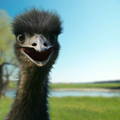
Trending Articles
Breathing Changes
Labored breathing in emus can be a symptom of several underlying health issues, including:
1. Respiratory Infections: Bacterial, viral, or fungal infections can affect the respiratory system, leading to difficulty breathing, coughing, or nasal discharge.
2. Parasites: Internal parasites, such as lungworms or gapeworms, can infest the respiratory tract, causing labored breathing and other respiratory distress.
3. Heat Stress: Emus are susceptible to heat stress, especially in hot climates. Prolonged exposure to high temperatures can lead to panting, labored breathing, and even heat stroke.
4. Obstruction: A physical blockage in the airways, such as from inhaled objects or swelling due to injury or infection, can cause labored breathing.
5. Allergic Reactions: Exposure to allergens like dust, pollen, or certain chemicals can cause respiratory distress and labored breathing in emus.
6. Toxins: Ingesting or inhaling toxic substances can lead to respiratory issues, including difficulty breathing.
7. Cardiac Problems: Heart-related issues can sometimes manifest as labored breathing, as the heart struggles to pump blood efficiently, leading to fluid buildup in the lungs.
8. Trauma: Injuries to the chest or lungs, whether from accidents or predation attempts, can result in labored breathing.
9. Pneumonia: Inflammation of the lungs due to infection or aspiration of food or liquid can cause severe breathing difficulties.
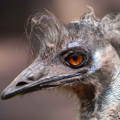
Trending Products
Copyright©2024 All rights reserved. We love to have you share our article as long as you include a direct link to this page. This article or any portion thereof , including all images, may not be reproduced or used in any manner whatsoever without the express written permission of Gypsy Shoals Farm.

